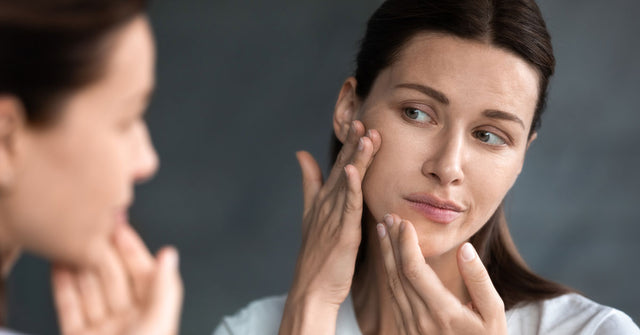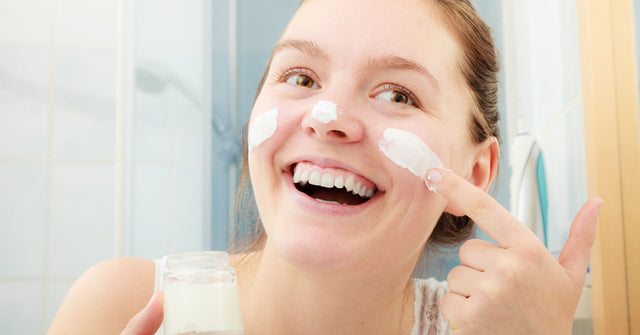Acne is a problem that is usually associated with the teen years, but as you reach adulthood, you may find that the issue continues to linger on. In fact, there are many older people who still have trouble managing their acne and oily skin. However, what you may not realize is that dry skin combined with acne is also a common issue.
Here we’ll look at dry skin acne, why it happens, and share some effective tips for addressing it and restoring optimal skin health.
What is Acne?
You may have experienced acne, but do you know what it actually is? Before we discuss dry skin acne, it’s important to explain that pimples are caused by an infection that develops in the hair follicles under the skin [1]. When the follicles become clogged, you may have a breakout, but what caused them to clog? There are two primary factors that come into play.
Sebum is a natural oil produced by the skin, and its primary function is to keep it hydrated and prevent dryness. The second factor is the dead cells that collect on your skin. Both can build up inside the follicles causing a blockage, and if bacteria begins to grow this results in acne.
About Dry Skin
Dry skin is a relatively common modern-day beauty concern, and it is often accompanied by irritation. You may also notice that your dry skin, or ‘xeroderma’, has a papery texture. There are several possible causes, including genetics, sun exposure, and even the type of skincare products you use.
What is Dry Skin Acne?
Acne can happen to anyone of any type, but oily and combination skin are the most prone to breakouts. However, that doesn’t mean people with dry skin don’t develop this problem.
Dry skin acne refers to pimples and breakouts that accompany dryness. It occurs because when your complexion is dry, your sebaceous glands may produce excess oil. This sebum can clog your pores, increasing your risk of breakouts.
What Are the Causes of Dry Skin Acne?
Now that you know the answer to the question, “Can dry skin cause acne?” we’ll consider those key root causes. Some are within your control, while others are not.
-
Harsh Cleansers: Using a harsh cleanser is one of the most common causes [2] of dry skin acne, especially since a dry complexion can also get easily irritated.
Steer clear of cleansers with harsh ingredients like fragrance or chemical additives, as they can increase sebum production and worsen dryness.
-
Unsuitable Skincare Products: Take a close look at the products you use as part of your regular routine. If you have dry skin, you should use formulas made for your type specifically.
-
Environmental Factors: There are environmental elements that can affect your skin, like the climate, UV rays, or even pollution. For example, if you work outdoors, dust can build up on your face during the day.
-
Dehydration: Not drinking enough water throughout the course of the day can lead to dehydration, which dries out your skin.
-
Hormonal Changes: Hormones play a role in sebum production and skin health. During times of your life when hormones fluctuate like puberty, pregnancy, or menopause, you may be more prone to dry skin.
-
Genetics: Your genetic makeup may be one factor that comes into play with dryness, as skin type is hereditary to a certain extent.
-
Stress: When you experience stress on a regular basis levels of the hormone cortisol increase, and if your anxiety is chronic it could cause bodily inflammation and make you more prone to dry skin acne.
-
Overuse of Acne Products: While acne skincare products are important to help you get rid of pimples, overusing them can be harsh on the skin and may even worsen your dryness and irritation.
How Do I Know if I Have Dry Skin?
It’s important to know your skin type, and if your complexion tends toward dryness there are a couple of things you can consider to determine if you fall into the ‘dry’ category. Dry skin is usually rough, both in its texture and appearance. It is sometimes accompanied by flakes, and many people with this skin type complain about itchiness.
Does Dry Skin Make Acne Worse?
It’s definitely possible for dry skin to make your existing acne worse, and there are several reasons for this. One of the key factors is that when your skin is very dry, your pores get larger, and the dryer your complexion the more they open.
We’ve already mentioned the fact that sebum and dead skin cells can get trapped in the follicles, and when the pores are larger it’s much easier for this debris to enter. In addition, it allows bacteria to delve deeper into your skin, worsening the condition.
Best Skincare Routine For Dry Skin Acne
It’s important to develop a good skincare routine that addresses both dry skin and acne. While you may sometimes be focused on how to dry out a pimple, in general, you should build a more complete regimen. In this section, we’ll provide you with a basic skincare routine and tips to help with dry skin acne.
-
Start With a Gentle Cleanser: Start your routine, both morning and evening, with a good cleanser that’s gentle on the skin. The Rejuvoderm Clarifying Cleanser is a great choice, as it removes debris and unclogs the pores without drying out your complexion.
-
Use the Right Acne Product: It’s important to have a product on hand to treat pimples and to include it in your routine if you are prone to breakouts. One formula we recommend is the Zeroblem Blemish Treatment Serum, which is a lightweight product that won’t make your dryness worse.
-
Apply Moisturizer: Moisturizing twice daily is essential to any skincare routine, especially if you have dryness. Infusoderm Deep Hydration Daily Moisturizer is a formula that deeply hydrates your skin, refreshes, revitalizes, and promotes a healthy, radiant glow.
-
Acne Spot Treatment: You may also want to use an acne spot treatment in some cases, but just make sure you carefully read through the list of ingredients to ensure that there are no irritants. Don’t overuse the product, as applying once or twice daily directly on each pimple should be enough.
-
Add Sunscreen: Protecting your skin from excessive sun exposure is critical. Apply sunscreen or a moisturizer with a built-in SPF every day, even if it’s not sunny outside.
-
Avoid Harsh Cleansers: Carefully choose the products you use on your dry skin acne. Stay away from formulas with harsh ingredients like parabens, sulphates, and fragrances as they will only make your existing problems worse.
-
Drink Plenty of Water: Hydration is important, so make sure you drink enough water on a daily basis. There are varied intake recommendations, but in general, you should aim for about eight glasses a day to keep your skin optimally hydrated [3].
FAQs
Is dry skin good or bad for acne?
Dry skin is prone to irritation, which you may quickly discover, and this can increase your risk of breakouts. Therefore, dryness is definitely bad for acne and may also lead to more pronounced scarring.
How long does dry acne last?
How long dry acne lasts depends on the cause and which methods you are employing to reduce it. Most of the time it takes pimples about a week to disappear, however, scarring may remain in some cases.
What types of acne are commonly associated with dry skin?
The type of acne most commonly associated with dry skin has bacteria buried in the deeper layers, as the dryness can widen the size of the pores to allow microbes and germs to enter more easily.
Does dry skin make acne worse?
Yes, it’s possible for dry skin to worsen your acne, for a couple of reasons. One of the main causes is that it widens your pores and allows bacteria to enter, leading to inflammation and irritation.Conclusion
If your skin is dry, you have a higher risk of developing acne. While some people have a naturally dry skin type, there are other factors that can cause this issue over time. For this reason, it’s important to understand the exact cause of your dryness so you can address the root issue, boost hydration, and reduce the impact that dry skin acne has on your life.
References
1] ↑ https://www.niams.nih.gov/health-topics/acne
2] ↑ https://www.ncbi.nlm.nih.gov/pmc/articles/PMC3088928
3] ↑ https://www.ncbi.nlm.nih.gov/pmc/articles/PMC2908954
Mentioned in this article
More stories

From Flakes to Fabulous: How to Deal with Dead Skin on Face?






